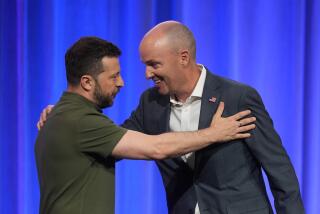The Washington Summit : Audience Is Wary : Gorbachev Tempts U.S. Businessmen
- Share via
WASHINGTON — Mikhail S. Gorbachev, the world’s top Communist, Thursday offered a rapt audience of American capitalists his vision of money-making opportunities in the Soviet Union, promising that investors’ property would be protected and profits would not be taxed for the first two years.
The reactions of many of the businessmen, aware of the difficulties encountered in the past by investors in the Soviet Union, were polite but noncommittal. In the words of Alexander Trowbridge, president of the National Assn. of Manufacturers, the audience was “certainly impressed with the man but inherently skeptical.”
Still, Trowbridge conceded, the audience of more than 50 leading industrialists, executives and bankers walked out “less afraid of trying than when they walked in.”
“Gorbachev has broken the ice . . . and more and more American firms” will be seeking Soviet business ventures, said Armand Hammer, chairman of Los Angeles-based Occidental Petroleum Corp., whose relations with the Soviet Union go back more than 65 years to the time of V.I. Lenin.
Businessmen ‘Enthusiastic’
“I’ve never seen such enthusiasm” in a meeting of American business officials and a Soviet leader, Hammer said.
A confident, forceful Gorbachev said the Soviet Union wants American companies, but on its own terms, according to American participants in the session at the Soviet Embassy.
Gorbachev and Vladimir M. Kamentsev, a deputy premier, mentioned, as potential areas of U.S. investment, energy, chemicals, agriculture, the production of machine tools, and even the use of Soviet rocket boosters to power U.S. satellites into space, according to participants.
The atmosphere was cordial and candid, with the Soviet leader confidently fielding questions from the audience. Jack Valenti, president of the Motion Picture Assn. of America, wanted to know how to get more U.S. movies onto Russian screens. Gorbachev replied, “Everywhere I go, I see American movies.”
7 Made in America
Valenti said he hesitated to correct a world leader, but he claimed that 117 foreign films were shown in the Soviet Union last year, with just seven of them made in America. Gorbachev mixed his pitch for business with criticism of the United States, however, claiming discrimination against the Soviet Union. His country does not have “most favored nation” status under U.S. law, which either wipes out many tariffs or keeps them very low.
“He said, ‘Treat us the same way you treat everyone else,’ ” Hammer said. Gorbachev cited a 110% U.S. tariff on jewelry from the Soviet Union, he said.
The United States has been reluctant to grant “most favored nation” status to the Soviet Union because of human rights issues and other political conflicts between the two countries.
Audience Charmed
Despite his criticisms of official U.S. policies, Gorbachev charmed the audience, said Walter Klein, chairman of Bunge Corp., a New York-based grain trading firm that conducts business with Moscow.
The Soviet leader also told his audience that new Soviet laws will protect foreign property from being confiscated and will waive all taxes until an investment has been profitable for two years.
The Soviets favor joint ventures between foreign investors and industrial or commercial branches of the Moscow government, Trowbridge said. But organizing these can be tediously complex, he added, advising that the Soviets need to “streamline the decision-making processes in the ministries of government.”
Pepsi for Vodka
Because of Soviet insistence, many of the joint ventures concentrate on exports, resulting in a barter-type arrangement. For example, Occidental Petroleum supplies chemical components for fertilizer to the Soviet Union and receives ammonia and other chemical compounds in return. Similarly, Pepsico Inc. supplies soft drinks and gets back vodka.
But American companies want more flexibility than this policy offers--and they may get it under Gorbachev.
According to one participant, when Kamentsev spoke about new “concepts” for joint ventures, Gorbachev interrupted him, declaring: “Concepts take forever. Let’s (have) real action.”
Companies represented at the meeting included Occidental, Bunge, Monsanto Co., Archer-Daniels-Midland Co., Dresser Industries Inc., Combustion Engineering Inc. and Turner Broadcasting System Inc.
Gorbachev’s objective was to “significantly arouse their interest,” Trowbridge said. “He’s a very impressive individual, and he achieved that.”
More to Read
Sign up for Essential California
The most important California stories and recommendations in your inbox every morning.
You may occasionally receive promotional content from the Los Angeles Times.













